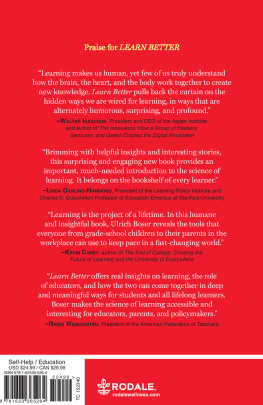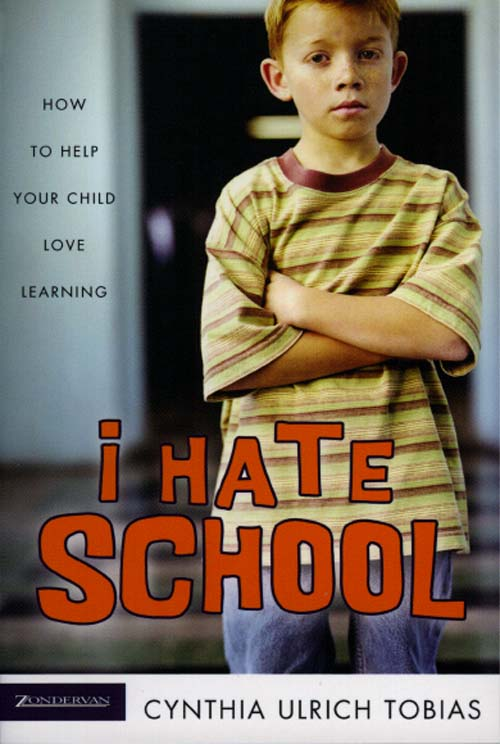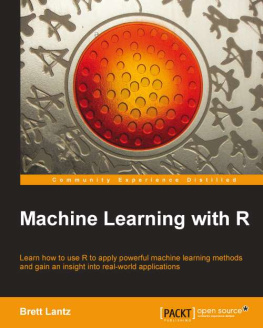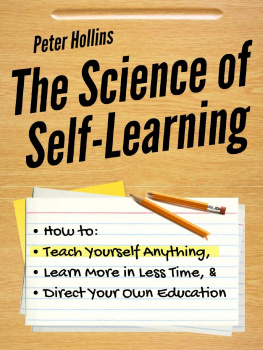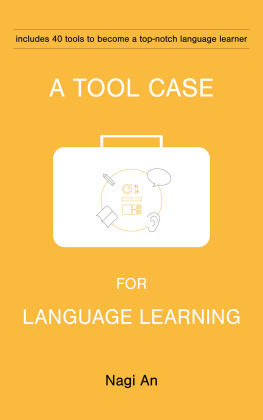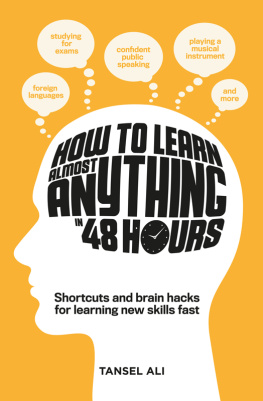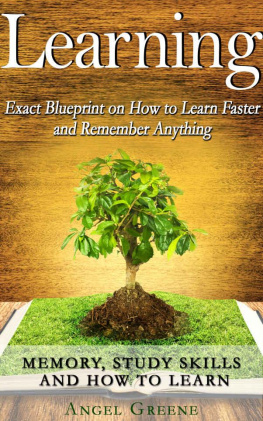
Notice
Mention of specific companies, organizations, or authorities in this book does not imply endorsement by the author or publisher, nor does mention of specific companies, organizations, or authorities imply that they endorse this book, its author, or the publisher.
Internet addresses and telephone numbers given in this book were accurate at the time it went to press.
2017 by Ulrich Boser
All rights reserved. No part of this publication may be reproduced or transmitted in any form or by any means, electronic or mechanical, including photocopying, recording, or any other information storage and retrieval system, without the written permission of the publisher.
Book design by Carol Angstadt
Library of Congress Cataloging-in-Publication Data is on file with the publisher.
ISBN13: 9781623365264 hardcover
ISBN13: 9781623365271 e-book

We inspire health, healing, happiness, and love in the world. Starting with you.
RodaleWellness.com
For my parents,
who helped spark my
love of learning.

AUTHORS NOTE
In this book, Ive used text that has previously appeared in other articles, reports, or blog items that Ive written. I also edited quotes for clarity and shared some portions of the text with sources to gain their feedback. If I use only a first name to describe someone, then the name is a pseudonym. If there are any errors of fact, citation or clarity, Ill list them on my website: www.ulrichboser.com.
With regard to citations, Ive found the use of footnotes in e-books distracting, and so I wrote up a notes section, which includes source material, notable asides, and further reading. With regard to conflicts of interest, I have somedont we all?and Ive done work for different organizations and foundations that I mention in this book. Again, see the notes section.
When it comes to writing about my own history, especially as it relates to events that occurred years ago, I wanted to write to the best of my knowledge at the end of every sentence. I did not, but please consider the caveat.
INTRODUCTION
The elementary school stood at the end of a cul-de-sac. It was a low-slung red-brick building some ten miles north of New York City, tucked away among ribbons of suburban streets, surrounded by solid ranchers and brawny Colonials. It was January 6, 1986, a cold morning, just above freezing. Parents pulled in front of the school in a convoy of cars, their children slipping out, laughing, talking, letting out the occasional raucous scream.
Shortly after 10:30 a.m., a young boy tucked himself into a chair in one of the schools classrooms. He was green-eyed with a big bowl of dirty blond hair. It was a few days before the boys 11th birthday, and he almost certainly wore a turtleneck sweater and corduroy pants. Pages of schoolwork stuffed his backpack, most likely mixed together with some Dungeons & Dragonsinspired drawings.
The green-eyed boy had a difficult time learning, and that morning was no different. Class began with the teacher discussing how to subtract one fraction from another, and the boy strode to the blackboard to answer a problem from his homework. But the boy wrote down the wrong equation and had to redo the problem.
Then the boy became distracted, twisting around in his seat, contorting like an aspiring Houdini, and the teacher scolded him: Please focus. The other children answered questions. They solved problems. But the green-eyed boy remained bewildered. So rather than work through the math problems, the boy simply cheated, copying down solutions from a friend sitting nearby.
Then, some twenty minutes into the class, the teacher called on the boy to answer a division problem: Whats 770 divided by 77? The boy didnt know. Another division question. Another confused grimace. Eventually, the class wound down. The teacher discussed homework assignments, while the green-eyed boy nattered on to a friendsports, books, recess, who knows. The teacher scolded the child one last time before the class let out.
In many ways, the boy with the green eyes is everyone. A lot of kids make a mess of their homework. Its easy to get distracted. But that child was me. I lumbered along in my classes. My grades were weak. I floundered on exams. Teachers complained about my inability to learn, one telling my mother I would probably become a cook. So one morning, in January 1986, a school psychologist slipped into my 4th grade classroom to observe me in class.
While Ive tried to recall the day, I dont have the slightest scrap of a memory. But for decades, I kept the psychologists detailed reporta single-spaced black-and-white typewriter-created document. It describes how I managed to cheat, neglect my work, and forgo all focus during the one hour-long class. Frustrated, inattentive, and distracted are among the words of the school psychologist used to describe me.
Kindergarten was probably my first academic challenge. I was the youngest in my class, and I ended up repeating the grade because I couldnt keep up. In elementary school, teachers sent me for special testing, and I filled in the bubbles of a long list of unpronounceable psychological exams that sound today like a bit of Psych 101the Bender Visual-Motor Gestalt Test, the Zeitlin Coping Inventory, the Projective Figure Drawing exam. For a few years in middle school, I spent a few hours each week in special education, a holding pen for cranks and misfits, social oddities, and academic outliers.
Different theories about the cause of my difficulties floated around, vague potential explanations. One account held that I was slow to learn because my immigrant parents spoke German at home. Others claimed that I had an auditory problem, that my brain wasnt wired correctly when it came to listening. Still others believed I lacked intelligence, that almost magical ability to think through issues and solve problems.
Theres a bit of accuracy to each of these theories. My parents have lived in this country for decades, yet they still sometimes slip into German while speaking English. I do, indeed, have a learning disorder that makes it difficult to follow auditory details, and I still have a hard time following verbal directions. And lets be clearIm no genius.
Theres another perspective on what happened, though, and when I look back now, it seems that I didnt know how to learn. I didnt have ways to think about my thinking. I didnt ask myself questions or set goals or even know what it meant to know something. The ability to learn appeared beyond me, and it left me lost, as the school psychologist wrote in her evaluation.
With the help of some teachers, I eventually developed a few basic learning strategies. I would ask myself questions like: Do I really know this? Did I understand the underlying logic of what I was learning? I also came to terms with the idea that people learned at different rates, that I might need to put in more effort than my peers. Over the years, I discovered better ways to focus, becoming a devotee of anything that promoted silence, and even today, I buy earplugs by the box.

